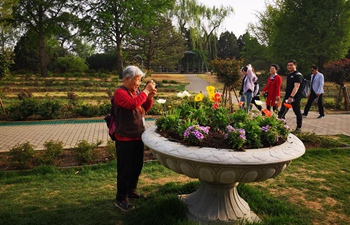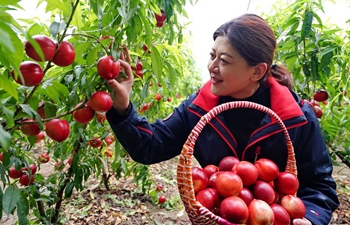By Xinhua Writer Luan Xiang
SHANGHAI, April 22 (Xinhua) -- For those that want to cut cholesterol, reduce carbon footprints or express compassion to animals, but cannot seem to quit meat, a novel MeatFest to be held in Shanghai might hold the answer.
China's first gourmet fair for "plant-based meat" delicatessens is scheduled in the eastern metropolis for Saturday April 27, according to the organizers.
Internationally renowned chefs from Shanghai's top restaurants will create a feast using "mock meat," a Chinese culinary tradition dating back over a thousand years, said Eve Samyuktha, organizer of the MeatFest and founder of the Vegans of Shanghai charity.
Food forms an indispensable part of Chinese culture. As early as the Tang Dynasty, the Chinese foodies who pitied animals invented "mock meat" with tofu and vegetables, a tradition that has lasted until the present day, Samyuktha told Xinhua.
The mock meat tradition has grown ever more popular in modern cuisine as the plant-based, whole-foods diets and vegan lifestyles hit the mainstream worldwide.
PLANT-BASED MEAT: CHINESE TRADITION
Plant-based meat is derived completely from protein-rich plants - beans, legumes, seeds and vegetables, but is textured and flavored to mimic animal meat, explained Eve, a chemical engineer by profession.
The purpose of these products is to help consumers switch from animal to plant-based protein without compromising on taste, she said.
"We were inspired by how the Beyond Meat and Impossible Burger brands have changed the way meat is perceived in Western countries," she said.
As veganism hits the mainstream, brands like Beyond Meat and Impossible Burger have become rising stars of the food industry, backed by investors such as Bill Gates, Leonardo DiCaprio, and former McDonald's CEO Don Thompson.
After studying these fashionable novelties, Eve was surprised to discover that, except for the plant-based heme released by soy leghemoglobin that gives Impossible Burger patty a blood-like color and taste, the composition was nearly identical.
In China several home-grown plant-based meat companies have inherited the long tradition and have been developing to cater to local and international demand.
"Plant-based meats in China: Already available, easily accessible and widely affordable. That is the message that we hope to send out at the MeatFest by bringing these local brands into spotlight," Samyuktha said.
In 1993, Whole Perfect Foods, a Taiwan-invested vegetarian food company brought an advanced production line of soy protein isolates from Germany to the Chinese mainland. It has created over 500 types of plant-based product, and its menu keeps evolving.
From vegan pork, beef and seafood to a variety of sausages and snacks, protein from different plants is used to satisfy different needs for a meaty taste, according to Xue Hongjun, the company's executive director.
The food is often described as too good to be fake. "We have spent 30 years doing just one thing. That is what makes us different," Xue told Xinhua.
WHY PLANT-BASED?
Plant-based alternatives to animal protein are gaining popularity as an ideal to reduce the negative health and environmental impact of industrial husbandry.
Research in recent years has pointed to animal agriculture as among the leading causes of climate change, soil erosion, water pollution, and the decrease in biodiversity.
A 2016 study by United Nations Food and Agricultural Organization estimated that farmed animals account for 14.5 percent of total greenhouse gas emissions and at least half of all food-related greenhouse gas emissions.
Studies in 2018 warned that over half the world's oceans are being industrially fished and that commercial fishing covered a bigger area than global agriculture.
The World Wildlife Fund's Living Planet Report 2018 alerted to a 60 percent decline in biodiversity in the past 40 years. In other estimates, a fifth of the Amazon was cut down in the past 50 years, mainly to raise cattle or grow soy for animal feed.
Beyond Meat and Impossible Foods received the 2018 Champions of the Earth award - the U.N. top accolade for environment - for their ingenious plant-based alternatives to meat.
For China, respecting nature and cherishing life has long been an important part of traditional ethics, said Professor Qiu Renzong with Chinese Academy of Social Sciences, in a recent interview with Xinhua.
With ancient traditions and new business opportunities in play, China is believed to be the next central stage for a diet revolution, according to experts and entrepreneurs at the Next Gen Good Food Forum, organized by venture capitalists looking to promote plant-based or clean meat solutions in China.
"In China, the mature generations are familiar with the mock meat tradition, while younger generations follow the rise of veganism as an international novelty," said Kelly Chen, co-founder and owner of a vegan fitness center in Beijing.
Kelly and another 100 vegan businesses hosted a Pop Plant-Based Festival in Beijing last September, attracting over 10,000 visitors in three days.
However, the MeatFest in Shanghai does not plan to focus merely on vegans/vegetarians but also welcomes meat-eaters to try eco-friendlier versions of the food they enjoy.
















